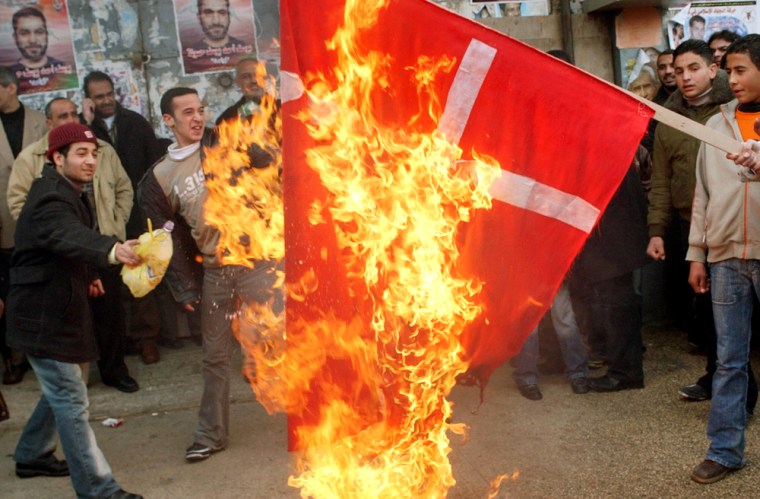Palestinian youths tried on Saturday to storm the European Union office in Gaza in protest over the printing by European newspapers of cartoons of the Prophet Muhammad that has whipped up fury across the Islamic world.
The leaders of Muslim-majority Indonesia and Malaysia added their voices to the chorus of condemnation of the cartoons of the Prophet Muhammad, one with a turban resembling a bomb, in a face-off between freedom of speech and respect for religion.
Inserting itself into the dispute that has become a lightning rod for anti-European sentiment in Muslim countries, the United States attacked the cartoons as offensive.
There were fresh demonstrations in several cities including Ankara and London. Around 500 students of Islamic seminaries or madrasas protested in the eastern city of Lahore on Saturday, chanting slogans of “Down with Denmark” and “Hang the culprits."
More newspapers reprint cartoons
Meanwhile, two New Zealand newspapers on Saturday reprinted the cartoons, which have appeared in newspapers in Denmark, France, Germany, Spain, Switzerland and Hungary, saying the decision was based on press freedom.
For many Muslims depicting the Prophet Muhammad is forbidden and European leaders have called for restraint, expressing concern about the firestorm that has erupted over the last days.
In Gaza, protesters threw stones at the EU office, burned tires outside and tried to enter the compound. They clashed with security forces who intervened and arrested two youths.
The youths took down the EU flag from the building and replaced it with the Palestinian flag.
They chanted slogans against Denmark and pledged to give their “blood to redeem the Prophet.” The cartoons first appeared in a Danish daily, Jyllands-Posten, last September.
Youths also attacked Germany’s nearby representative office, smashing windows with hammers and damaging the courtyard. A burned German flag was found on the floor. No staff were believed to have been in either building.
Indonesian President Susilo Bambang Yudhoyono and Malaysian Prime Minister Abdullah Ahmad Badawi called on their countries’ Muslims to exercise restraint.
“The Indonesian government condemns the printing of the caricatures of the Prophet Muhammad. The insult to religious symbols have hurt the feelings of the Muslim,” Yudhoyono, leader of the world’s most-populous Muslim nation, said.
New protests, calls for trade boycott
Malaysia’s Abdullah branded the publication of the images a “blatant disregard for Islamic sensitivities.”
Foreign Minister Abdullah Gul of Muslim but secular Turkey, an EU candidate country, repeated Ankara’s call for calm and for mutual respect between Muslims and non-Muslims.
“Of course there should be freedom of the press everywhere. But without doubt, respect for our values must not be abandoned for the sake of freedom,” Gul said in televised remarks.
Separately, protesters held another demonstration outside the Danish embassy in Ankara, laying a black wreath and vowing to boycott Danish products.
The United States also stepped into the furor.
“These cartoons are indeed offensive to the belief of Muslims,” State Department spokesman Kurtis Cooper said. “We all fully recognize and respect freedom of the press and expression, but it must be coupled with press responsibility. Inciting religious or ethnic hatreds in this manner is not acceptable.”
The United States, which before the Sept. 11 attacks was criticized for insensitivity to the Islamic culture, has tried to become more attuned to Muslim sensibilities. Accusations last year that U.S. officials desecrated the Koran sparked deadly riots in Asia and heightened that awareness.
The U.S. response contrasted with European governments, which have tended to acknowledge tension between free speech and respect for religion but have generally accepted papers’ rights to print the cartoons.
In an interview with La Repubblica daily, European Justice Commissioner Franco Frattini said the European Union could not apologize for the offence caused.
“No, it’s not Europe’s duty, nor do I think it is the duty of (Danish) Prime Minister Rasmussen. We don’t have the power to apologize in the name of the press. That would be violating the basis of freedom of the press. If they feel it is right, it is up to the editors and the authors of the cartoons to apologize to those who feel offended," Frattini said.
